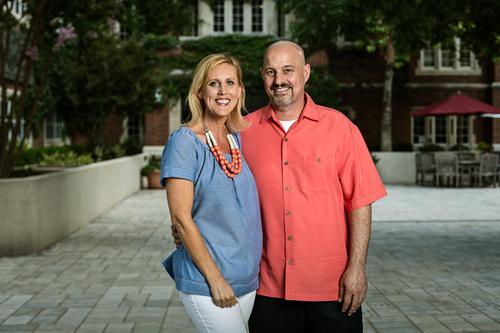The day before Thanksgiving in 2015, Mike Schuster’s life changed in an instant.
Teresa and Mike Schuster
Schuster, then 50, blacked out when he suffered a seizure while working at his desk at a roofing company in Newcastle. The next thing he remembers is awakening in an ambulance.
At Norman Regional Hospital, Schuster underwent an MRI. The prognosis was grim: Glioblastoma, the most aggressive form of brain cancer. From diagnosis, the cancer has a median survival rate of 12 to 18 months.
“Mike had no health problems. He barely even got colds. Nothing,” said his wife of 28 years, Teresa. “I couldn’t comprehend the words ‘tumor’ and ‘cancer.’ The doctor even showed me an X-ray of the tumor, and I said, ‘No. He’s tired. He just needs a nap.’”
Despite surgery, chemotherapy and radiation, the cancer returned. So in early 2017, Schuster enrolled in a clinical trial of OKN-007, an investigational drug discovered by Oklahoma Medical Research Foundation scientists Drs. Robert Floyd and Rheal Towner.

Teresa and Mike Schuster
This Thanksgiving, Schuster will celebrate an anniversary he’d only dreamed possible: five years since his diagnosis. It’s a milestone just one in 20 glioblastoma patients reach.
Schuster attributes his against-the-odds survival to OMRF’s development of OKN-007. “That drug saved my life. And it was developed right here where I live. Where I raised my family,” he said.
In the half-decade since doctors found the cancer, Schuster saw his son Connor graduate from high school and college and enroll in law school. Parker, his older son, earned his bachelor’s degree in mechanical engineering. And in August, Schuster sat hand-in-hand with Teresa and watched as Parker got married.
Teresa (left) and Mike (right) Schuster at Parker and Julia Schuster’s wedding.
“God put me in the right place at the right time. I’ve seen a lot I wasn’t expected to — moments I wouldn’t have wanted to miss for anything,” said Schuster.
But recovery has tested Schuster, too. A surgery left a wound on his head that’s resistant to healing and prone to infection. Problems with the site have resulted in numerous brain bleeds, painful skin grafts, repeated staph infections, dozens of brain scans and daily medications. He can’t bend over or lift more than 10 pounds.

Teresa (left) and Mike (right) Schuster at Parker and Julia Schuster’s wedding.
Still, said Teresa, those struggles can’t dim the joy that has come with almost 2,000 sunrises since her husband’s diagnosis. “We can’t take a blessing like reaching this milestone for granted.”
At the OU Health Stephenson Cancer Center and other sites, OKN-007 continues to undergo clinical testing in cancer patients. In addition to glioblastoma, the drug has shown promise in a rare form of pediatric cancer. In August, the FDA awarded OKN-007 a pair of designations that will provide special status and priority review for regulatory applications for the drug.
OMRF’s Towner says the drug has also shown potential in treating uterine cancer and diseases of neuroinflammation, particularly Lou Gehrig’s disease, or ALS. “Enthusiasm for OKN-007 is very high,” he says. “It’s going to be a drug that can provide real hope to patients. Researchers are still finding new potential uses, and I anticipate we’ll see a lot more stories like Mike’s in the future.”
Although this Thanksgiving is indeed noteworthy, Schuster says there will be no big party. The real celebration comes with keeping their traditions just as they’ve always been.
They’ll have a potluck at Teresa’s parents’ house. They’ll watch the Cowboys game. And when they go around the big table to say what they’re thankful for? “Well, I have a lot to choose from,” Mike said with a smile.
SOURCE Oklahoma Medical Research Foundation

Related Links
To view original content, please click here

